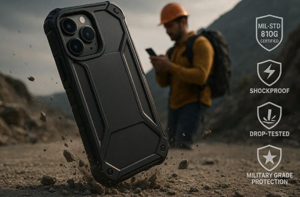
In a world where our entire lives are stored on our smartphones, security is no longer a feature—it's a necessity. As we step into 2025, the buzz around foldable phones is louder than ever, with designs becoming thinner, more durable, and increasingly mainstream. However, this innovative form factor brings new considerations for protecting our sensitive data. A Folding Phone With Advanced Encryption is not just a luxury; it's an indispensable tool for professionals, privacy-conscious individuals, and anyone who values their digital security.
This comprehensive guide explores the critical intersection of cutting-edge hardware and next-generation cybersecurity. We will delve into what advanced encryption means in the context of a foldable device, why it's crucial, and which products are leading the charge in 2025.
Understanding Advanced Encryption in Foldable Phones
What are the core concepts of mobile encryption?
At its heart, mobile device encryption is the process of converting the data on your device into an unreadable code, making it inaccessible to anyone without the proper key (like a password, PIN, or biometric authentication). This is the foundational layer of mobile security. Key cryptographic concepts include AES (Advanced Encryption Standard), a widely used and secure method for locking down data, and asymmetric encryption (or public-key cryptography), which uses a pair of keys for secure data exchange and digital signatures, forming the backbone of secure messaging and transactions. For mobile devices, where efficiency is key, Elliptic Curve Cryptography (ECC) provides robust security with smaller key sizes, making it ideal for the resource constraints of a smartphone.
Why is encryption especially important for foldable phones?
Foldable phones, with their expansive inner displays, are designed for productivity and multitasking, often displaying more sensitive information at once than a traditional phone. This larger “attack surface” from a software perspective means robust security is paramount. The unique hardware, including the complex hinge mechanism, and the specialized software that manages the transition between folded and unfolded states, introduce new complexities that must be secured from the ground up. Closing a foldable phone can act as a physical privacy shield in public, but its digital defenses are what truly keep your data safe.
What key security terminology should I know?
To fully grasp the security of a modern foldable, it helps to understand a few terms:
-
End-to-End Encryption (E2EE): This ensures that a message or data is encrypted on the sender's device and can only be decrypted by the intended recipient. It's a gold standard for secure messaging apps.
-
Biometric Security: This uses your unique biological characteristics—like a fingerprint or your face—for authentication. Top-tier phones often store this biometric data in a physically isolated, secure chip.
-
Quantum-Resistant Encryption: As quantum computers become more powerful, they pose a threat to current encryption standards. Phone manufacturers are beginning to implement quantum-safe algorithms to future-proof device security, a key feature in high-security models.
-
Hardware-Level Security: This refers to security features built directly into the phone's silicon, such as an independent security chip. Platforms like Samsung Knox are designed to provide this deep-level protection for your data.
How is Advanced Encryption Implemented in 2025 Foldables?
What steps are taken to implement robust security?
Manufacturers implement security at both the hardware and software levels. This starts with a secure boot process to ensure the operating system hasn't been tampered with. It extends to dedicated security platforms, like Samsung Knox, which create encrypted, isolated environments for sensitive apps and data. Google’s Pixel phones utilize custom Tensor chips and a security core for on-device AI and data protection. The trend is clear: critical data, especially for AI-powered features, is increasingly processed and stored directly on the device in a secure enclave, rather than being sent to the cloud.
What are the best practices for users to stay secure?
While manufacturers provide powerful tools, user habits are a critical link in the security chain.
-
Enforce Strong Authentication: Always use a strong passcode or PIN and enable biometric authentication like a fingerprint or facial recognition. For your most important accounts, enable multi-factor authentication (MFA).
-
Keep Everything Updated: Regularly install software updates for your phone’s operating system and applications. These updates often contain vital security patches that protect against newly discovered vulnerabilities.
-
Be Wary of Public Wi-Fi: Avoid accessing sensitive information like banking accounts on public Wi-Fi networks. If you must use one, use a Virtual Private Network (VPN) to encrypt your connection.
-
Enable Remote Services: Ensure features that allow you to remotely lock or wipe your device are enabled. This is your first line of defense if your phone is lost or stolen.
What are the common challenges in mobile security?
The primary challenge is balancing ironclad security with user convenience. Users want to access their devices quickly, so security measures like biometrics have become popular. Another challenge is the constant evolution of cyber threats; malware is becoming more sophisticated, sometimes using AI to adapt and bypass traditional security measures. For foldables specifically, developers must ensure their apps are optimized and secure across different screen sizes and states, which can increase development time and cost.
Benefits of a Folding Phone With Advanced Encryption
What are the key benefits of strong encryption?
The most significant benefit is data privacy and protection. Encryption ensures that even if your device falls into the wrong hands, your personal photos, messages, financial data, and corporate information remain confidential and inaccessible. This is crucial for protecting against identity theft and financial fraud. For professionals, strong on-device security enables secure remote work and helps meet compliance with data protection regulations like GDPR.
How can I measure the success of my device's security?
The truest measure of success is the absence of security incidents. A well-secured device gives you peace of mind, knowing that your digital life is protected. Success means you can confidently perform financial transactions, store sensitive documents, and communicate privately without fear of compromise. It builds trust between you and the device manufacturer, knowing they have prioritized your digital safety.
Spotlight: Top Secure Folding Phones of 2025
As the market matures, several models stand out for their commitment to security.
-
Samsung Galaxy Z Fold 7: Expected to be a leader in the premium space, the Galaxy Z Fold 7 will likely feature the latest iteration of Samsung's Knox security platform. Samsung has a strong track record of providing long-term security updates and leveraging hardware-level protection to safeguard data, making it a top choice for both enterprise users and security-conscious consumers. It's also anticipated to boast a powerful 200MP camera and a thinner, more refined design.
-
Google Pixel 10 Pro Fold: Following its predecessors, the Pixel 10 Pro Fold is expected to run on a new Tensor G5 chip, emphasizing on-device AI and security. Google’s strength lies in its clean software experience and long-term OS updates, which ensure timely security patches. Features like a built-in VPN and advanced AI privacy controls make it a compelling option for those embedded in the Google ecosystem.
-
VERTU QUANTUM FLIP: For those demanding the highest level of privacy, VERTU offers devices with specialized features like quantum encryption. This model is designed for users who handle extremely sensitive information and require features that go beyond standard consumer-grade security, such as instant data wipe capabilities.
-
OnePlus Open: Known for its powerful performance, the OnePlus Open also includes an independent security chip designed to physically isolate biometrics and other sensitive data for enhanced protection.
2025 Secure Foldable Phone Comparison
| Feature | Samsung Galaxy Z Fold 7 | Google Pixel 10 Pro Fold | VERTU QUANTUM FLIP |
| Expected Security Platform | Samsung Knox (Hardware & Software) | Google Tensor G5 Security Core | Custom High-Security Framework |
| Key Encryption Feature | Knox Enhanced Encrypted Protection | On-Device AI & Private Compute Core | Quantum-Safe Encryption |
| Biometric Security | Under-display fingerprint, Face Unlock | Under-display fingerprint, Face Unlock | Multi-fingerprint Unlock |
| OS Update Commitment | 7 years of OS & Security Updates (Promised for recent models) | Long-term OS and security updates | Varies (Focus on security patches) |
| Standout Feature | Deep enterprise integration; DeX support. | Advanced AI-powered privacy tools; Built-in VPN. | Ultimate privacy with features like instant data wipe. |
Who Is This For?
A folding phone with advanced encryption is ideal for:
-
Business Professionals and Executives: Who handle sensitive corporate data and require a device that can serve as a secure mobile workstation.
-
Privacy-Conscious Individuals: Anyone who wants to ensure their personal communications, photos, and financial information are protected to the highest standard.
-
Tech Enthusiasts: Early adopters who want the latest in mobile technology without compromising on security.
-
Enterprise Deployments: Companies looking to equip their employees with powerful, versatile, and secure devices for remote and hybrid work environments.
Frequently Asked Questions (FAQ)
1. Is a folding phone inherently less secure than a regular phone?
No, a folding phone is not inherently less secure. Security is determined by the manufacturer's implementation of hardware and software protections. Leading brands like Samsung and Google apply the same rigorous security standards to their foldable lines as they do to their flagship traditional phones, including features like hardware-level encryption and regular security updates.
2. What is quantum encryption, and do I really need it?
Quantum encryption refers to cryptographic methods that are secure against an attack by a quantum computer. For the average user in 2025, it is an advanced, “nice-to-have” feature rather than a strict necessity. However, for individuals or organizations handling highly sensitive, long-term data (like government or financial secrets), it represents the future of data protection.
3. How can I make my current foldable phone more secure?
You can significantly enhance your phone's security by following best practices: use a strong, unique passcode; enable multi-factor authentication on your accounts; only download apps from official stores like the Google Play Store or Apple App Store; regularly check for and install OS and app updates; and be cautious about phishing links in emails and messages.








